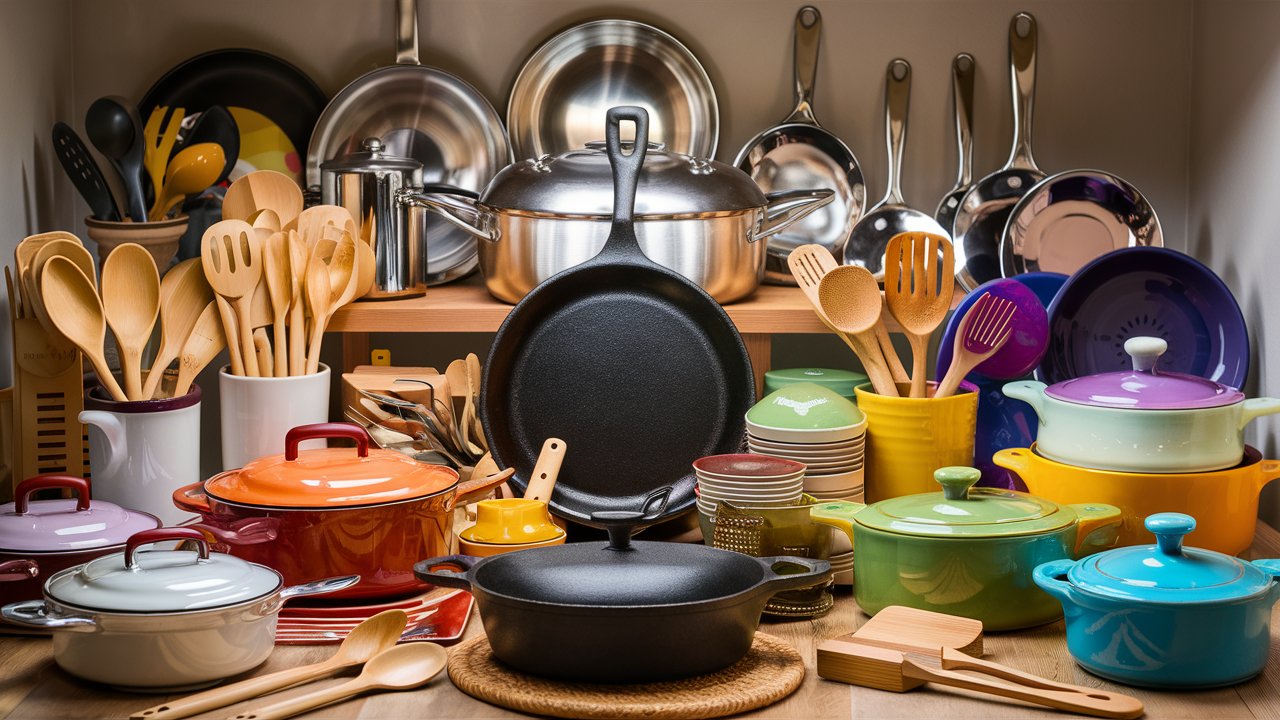Sustainable Cookware for the Foodie at Home
As the culinary world increasingly embraces sustainability, home chefs are following suit, seeking eco-friendly alternatives for their kitchen essentials. The rise of sustainable cookware not only reflects a growing environmental consciousness but also a desire for high-quality, durable kitchen tools that enhance the cooking experience. Let’s explore the world of eco-friendly cookware options that can elevate any home chef’s culinary creations while reducing environmental impact.
The Importance of Sustainable Cookware
Before diving into specific products, it’s crucial to understand why sustainable cookware matters:
1. Environmental Impact: Traditional non-stick cookware often contains harmful chemicals that can leach into food and the environment. Sustainable alternatives use safer materials and production methods.
2. Longevity: Eco-friendly cookware is often more durable, reducing the need for frequent replacements and thereby decreasing waste.
3. Health Benefits: Many sustainable options, like cast iron, can add beneficial minerals to food and avoid potentially harmful chemicals found in some non-stick coatings.
4. Energy Efficiency: Certain sustainable materials, such as cast iron, retain heat better, potentially reducing energy consumption during cooking.
Cast Iron Cookware
Cast iron cookware stands as a paragon of sustainability in the kitchen. Its longevity, versatility and eco-friendly properties make it a favorite among environmentally conscious home chefs.
Benefits of Cast Iron:
• Durability: With proper care, cast iron can last for generations, reducing waste from frequent replacements.
• Versatility: It can be used on stovetops, in ovens and even over campfires.
• Non-toxic: Cast iron doesn’t contain harmful chemicals found in some non-stick coatings.
• Heat Retention: Its excellent heat retention properties can lead to energy savings during cooking.
• Flavor Enhancement: Well-seasoned cast iron can impart subtle flavors to dishes.
Popular Cast Iron Items:
1. Skillets: Perfect for searing, frying and even baking.
2. Dutch Ovens: Ideal for slow-cooking, braising and making bread.
3. Griddles: Great for pancakes, grilled sandwiches and more.
Care Tips: To maintain cast iron, season it regularly, avoid harsh soaps and dry thoroughly after cleaning to prevent rust.
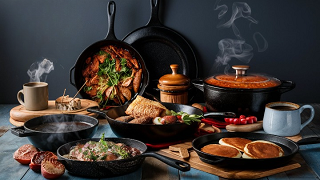
Recycled Aluminum Bakeware
Recycled aluminum bakeware offers a sustainable alternative to traditional options, combining the benefits of aluminum’s heat conductivity with eco-friendly production methods.
Advantages of Recycled Aluminum Bakeware:
• Energy Efficiency: Recycling aluminum requires significantly less energy than producing new aluminum.
• Lightweight: Easier to handle than heavier materials like cast iron.
• Even Heat Distribution: Ensures consistent cooking results.
• Durability: Resists warping and can last for many years with proper care.
Popular Recycled Aluminum Items:
1. Baking Sheets: Essential for cookies, roasting vegetables and more.
2. Cake Pans: Available in various shapes and sizes for all baking needs.
3. Muffin Tins: Perfect for cupcakes, muffins and individual portions.
Eco Tip: Look for bakeware made from high percentages of recycled aluminum to maximize environmental benefits.
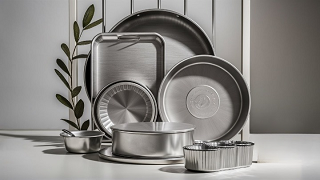
Bamboo Utensils
Bamboo utensils offer a sustainable alternative to plastic or metal options, bringing a touch of natural elegance to the kitchen.
Benefits of Bamboo Utensils:
• Renewable Resource: Bamboo grows rapidly and doesn’t require pesticides or fertilizers.
• Biodegradable: Unlike plastic, bamboo utensils will decompose naturally at the end of their life.
• Non-Scratch: Safe to use with non-stick cookware without risking damage.
• Antimicrobial Properties: Bamboo naturally resists bacterial growth.
Essential Bamboo Utensils:
1. Spatulas: Great for stirring, folding and scraping bowls.
2. Spoons: Perfect for serving and cooking.
3. Tongs: Useful for grilling and serving salads.
Care Instructions: Hand wash bamboo utensils and occasionally treat with food-grade mineral oil to prevent drying and cracking.
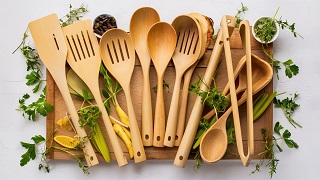
Stainless Steel
Stainless steel cookware offers another sustainable option for the eco-conscious home chef, prized for its durability and recyclability.
Advantages of Stainless Steel:
• Long-Lasting: With proper care, stainless steel cookware can last a lifetime.
• Recyclable: At the end of its life, stainless steel can be fully recycled.
• Versatile: Suitable for all cooking surfaces, including induction.
• Easy to Clean: Dishwasher safe and resistant to stains and odors.
Popular Stainless Steel Items:
1. Saucepans: Essential for cooking sauces, grains and vegetables.
2. Stock Pots: Perfect for soups, stews and pasta.
3. Sauté Pans: Ideal for searing and sautéing a variety of dishes.
Pro Tip: Look for stainless steel cookware with an aluminum or copper core for better heat distribution.
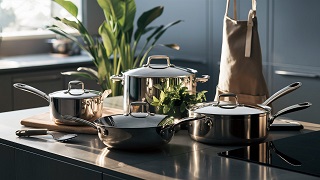
Ceramic Cookware
Ceramic cookware offers a non-toxic alternative to traditional non-stick pans, combining eco-friendly properties with excellent cooking performance.
Benefits of Ceramic Cookware:
• Non-Toxic: Free from PFOA, PTFE and other harmful chemicals.
• Energy Efficient: Ceramic retains heat well, potentially reducing cooking times.
• Easy to Clean: The smooth surface makes for easy cleaning, often requiring just a quick wipe.
• Versatile: Suitable for stovetop and oven use.
Key Ceramic Cookware Items:
1. Frying Pans: Great for eggs, pancakes and other foods prone to sticking.
2. Casserole Dishes: Perfect for oven-to-table serving.
3. Baking Dishes: Ideal for roasting and baking.
Note: While durable, ceramic cookware can chip if dropped or subjected to sudden temperature changes. Handle with care to extend its lifespan.
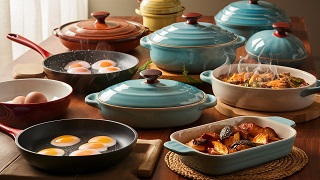
Glass Bakeware
Glass bakeware offers a classic, sustainable option for baking and food storage.
Advantages of Glass Bakeware:
• Recyclable: Glass can be recycled indefinitely without loss of quality.
• Non-Reactive: Doesn’t interact with acidic foods, preserving flavor.
• Transparency: Allows for easy monitoring of cooking progress.
• Versatile: Can go from freezer to oven to table.
Essential Glass Bakeware Items:
1. Casserole Dishes: Perfect for lasagnas, casseroles and baked desserts.
2. Loaf Pans: Ideal for bread and meatloaf.
3. Pie Plates: Great for pies, quiches and tarts.
Safety Tip: Always allow glass bakeware to cool before washing to prevent thermal shock and potential breakage.
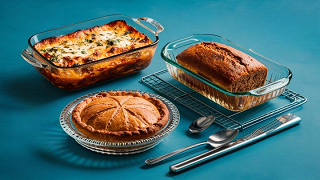
Embracing Sustainable Cooking Practices
While sustainable cookware forms the foundation of an eco-friendly kitchen, consider these additional practices to further reduce your culinary carbon footprint:
1. Energy-Efficient Cooking: Use lids to trap heat, match pot size to burner size and avoid preheating unnecessarily.
2. Meal Planning: Reduce food waste by planning meals and using leftovers creatively.
3. Composting: Compost vegetable scraps and eggshells to enrich garden soil.
4. Local and Seasonal Ingredients: Support local farmers and reduce transportation emissions by choosing seasonal, locally-sourced ingredients.
Conclusion
Transitioning to sustainable cookware is a meaningful step towards a more eco-friendly kitchen. From the timeless durability of cast iron to the lightweight efficiency of recycled aluminum and the natural elegance of bamboo utensils, there are numerous options to suit every cooking style and preference.
Remember, the most sustainable choice is often the one you’ll use for years to come. Invest in high-quality pieces that match your cooking habits and preferences. With proper care, these sustainable cookware options can last a lifetime, reducing waste and enhancing your culinary creations.
As you embark on your sustainable cooking journey, consider gradually replacing items as they wear out rather than discarding serviceable cookware. Each eco-friendly addition to your kitchen is a step towards more mindful, environmentally conscious cooking.
By choosing sustainable cookware and adopting eco-friendly cooking practices, home chefs can create culinary masterpieces while contributing to a healthier planet. So, equip your kitchen with these sustainable tools and let your culinary creativity flourish in harmony with the environment. Happy cooking!

